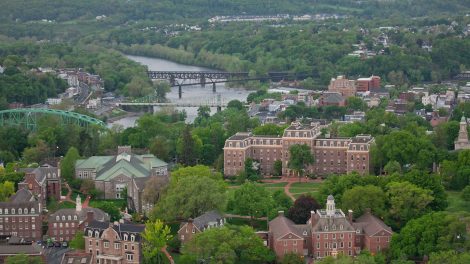Jodi Graf ’20 awarded NSF Graduate Research Fellowship
By Bryan Hay
Jodi Graf ’20 has been awarded a National Science Foundation Graduate Research Fellowship, which will support her ongoing research in pulmonary therapeutics at University of Delaware.
Highly competitive, NSF Graduate Research Fellowships are given to students pursuing or planning to pursue a research-based graduate degree program in a STEM-related field. Fellowships are awarded to exceptional students to support furthering their research and professional advancement.

Jodi Graf ’20
“I am interested in developing pulmonary therapeutics—medicines that are inhaled and delivered directly to the lungs,” says Graf, who received her degree in chemical engineering from Lafayette. “One major limitation to developing new inhaled medicines is the lack of physiologically relevant models to evaluate new drugs.”
“My project focuses on applying hydrogels as biomimetic tools to mimic the lung microenvironment, particularly for chronic obstructive pulmonary disease (COPD) applications,” she says. “Using these models, I aim to develop better therapies to reduce chronic lung inflammation.”
At University of Delaware, she is co-advised by Catherine Fromen, assistant professor of chemical and biomolecular engineering, and April Kloxin, Thomas and Kipp Gutshall Development Professor of Chemical and Biomolecular Engineering.
“I am excited to continue this work with my amazing advisers, with the help of the NSF Graduate Research Fellowship,” Graf says. “The NSF fellowship will allow me extra funding for my project, giving me the resources and flexibility to define my own goals and directions for my research.”
She says receiving the fellowship was a direct result of her experiences at Lafayette.
“At Lafayette, I majored in chemical engineering and conducted research with Prof. Lauren Anderson (professor of chemical and biomolecular engineering and William Jeffers Director of the Engineering Division) for two years,” Graf says. “My work with Prof. Anderson sparked my interest in biomaterials. I did two projects focused on stimuli-responsive materials for medical applications—one project with electrospinning nanofibers for tissue engineering scaffolds and another synthesizing hydrogels for drug delivery.
“Prof. Anderson helped me find my love of research and supported me throughout my grad school and NSF fellowship applications, even after being out of grad school for two years, having worked at Merck,” she adds. “All the professors I had at Lafayette gave me the confidence and foundational knowledge I needed to succeed in both industry and academia.”
Graf knew that when she decided to go back to school, she could rely on her former Lafayette professors for advice and support.
“I can’t thank the faculty of the ChemE department enough for all the opportunities they have provided me,” she says.
“At Lafayette, a small undergrad-only institution, I was given the unique opportunity to be the leader of my research,” Graf says. “Not many large institutions offer this opportunity; typically, undergraduate students are shadowing older grad students.”
She credits her independent research experience for her success and for getting accepted to her choice of grad schools and being awarded the NSF fellowship.
“Many people underestimate Lafayette as a small liberal arts school, but I believe that the close-knit community gives students a unique edge,” Graf says.

